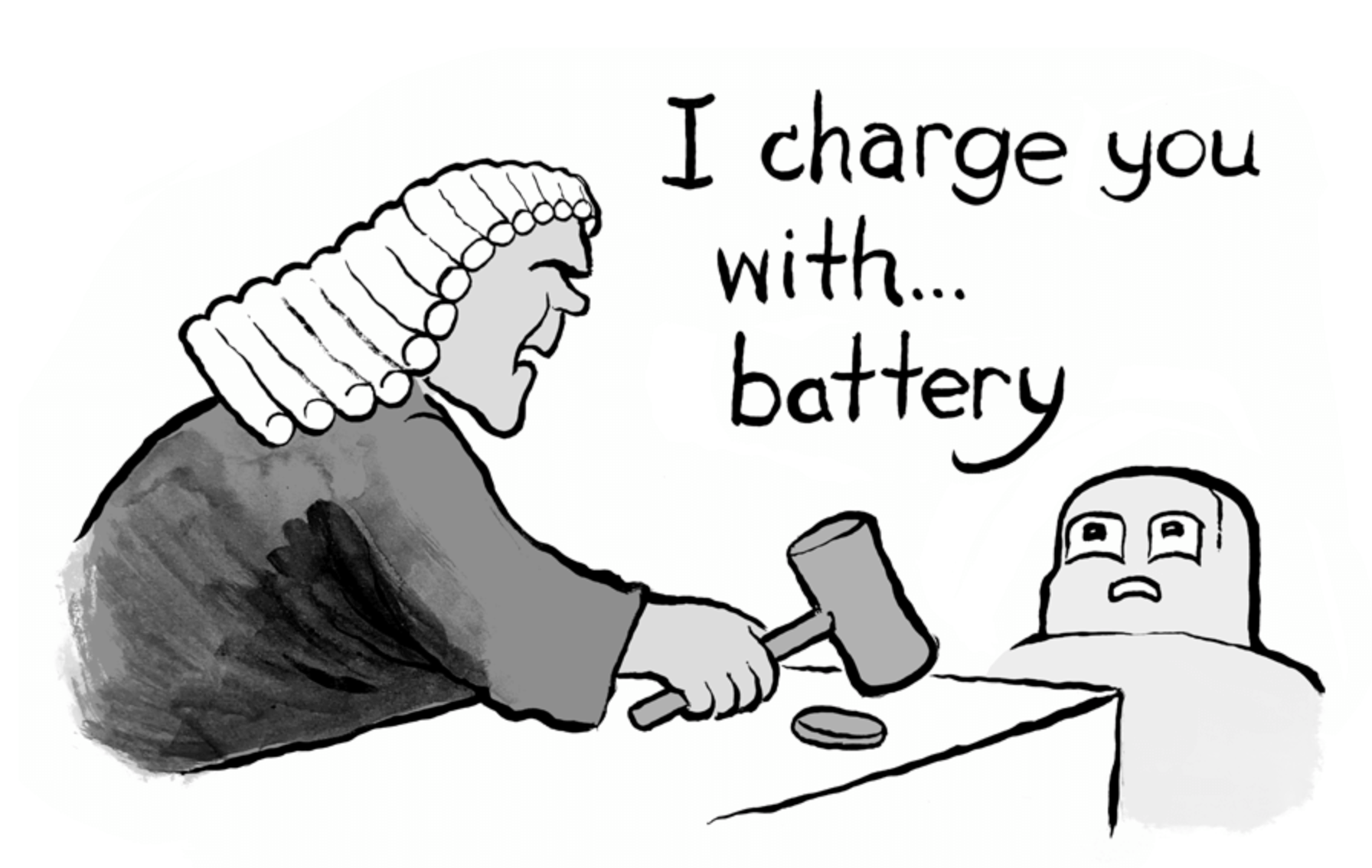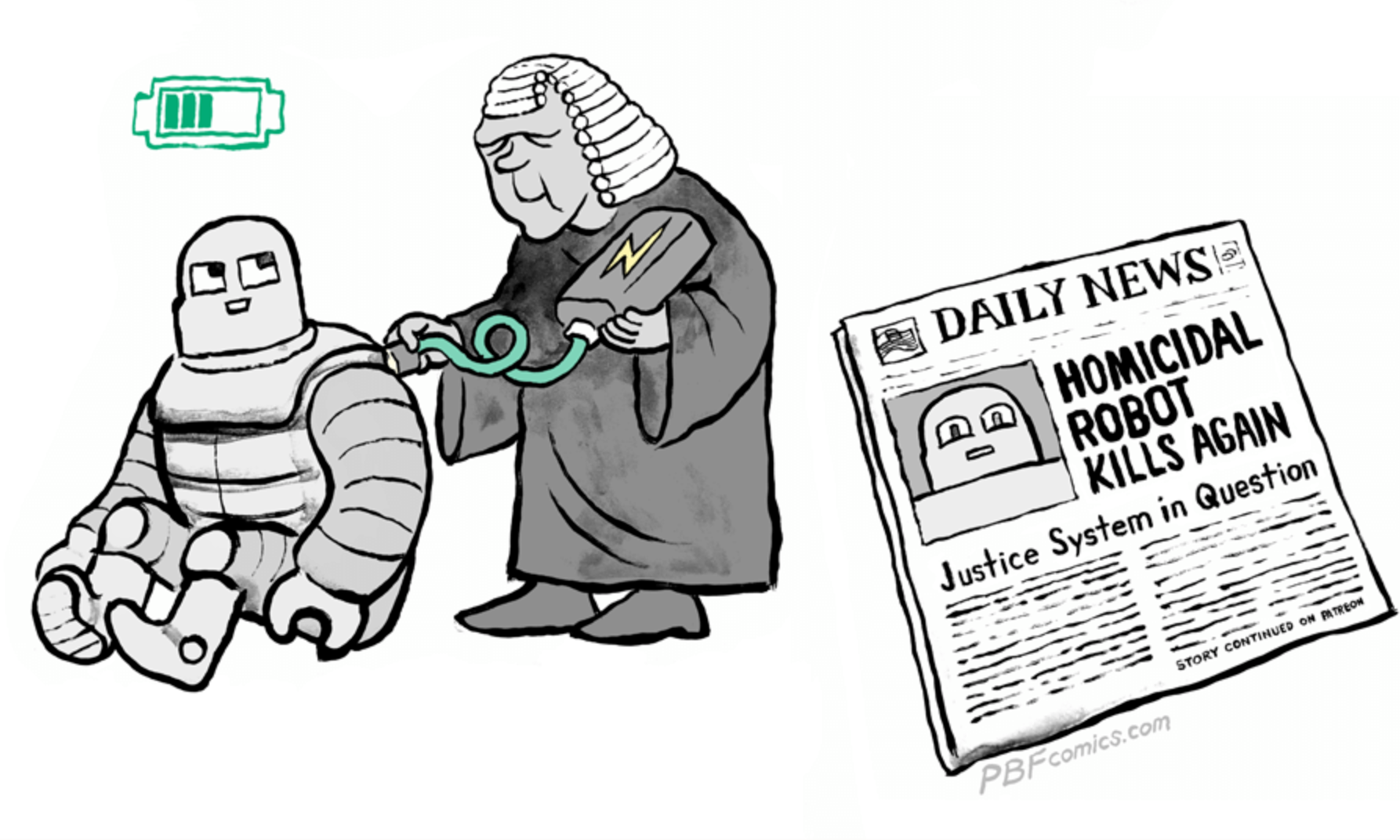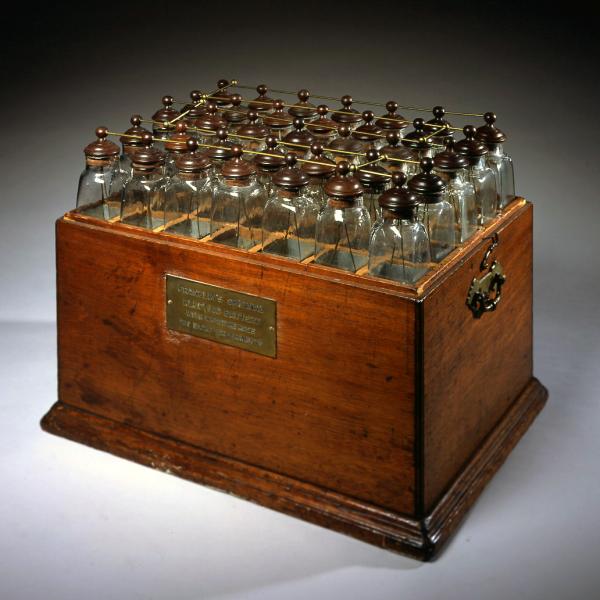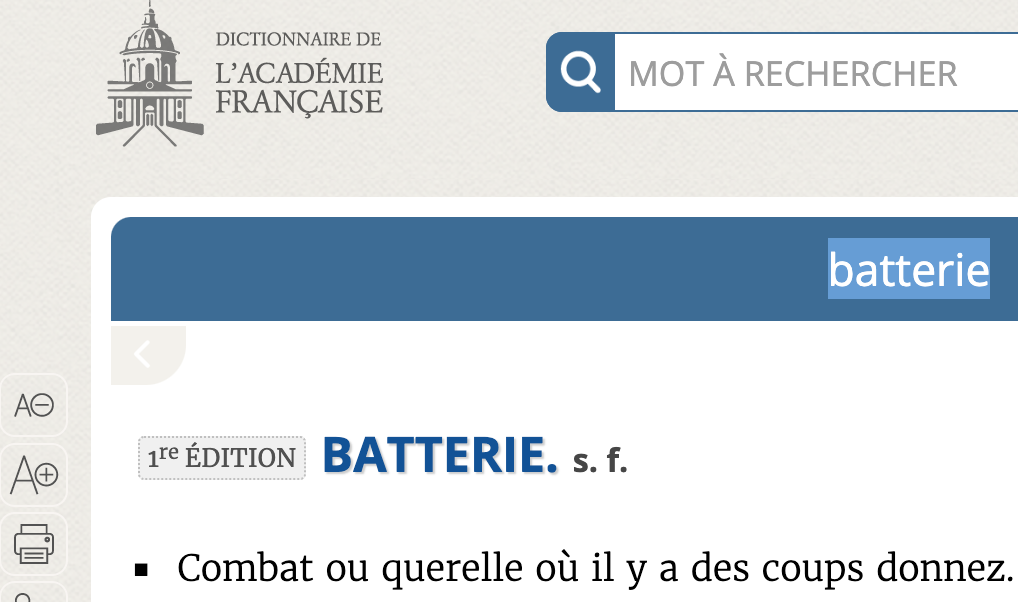Semantic drift of the week
« previous post | next post »
…or maybe we should call it a "semantic jump"? It's a pun that illustrates how word meanings can evolve along sensible paths that become obscure as time passes and culture changes. Which is one of the reasons that the reconstruction of linguistic history gets harder as time depth increases.
Here's the upper scene in the latest Perry Bible Fellowship comic:
…and the lower scene:
It never occurred to me before to wonder, why do we use the same word battery both for "The infliction of unlawful physical violence on a person" and also for "A device used to power electric devices" — among many other meanings?
And also, why do we use the word charge for "An official description of a crime that somebody may be guilty of" or "To formally accuse of a crime", and also for "The energy content of a battery, or a device containing a battery" or "To replenish the energy content of a battery"? (Again, among many other senses.)
I'll leave the history of charge for another day, and focus this morning on battery, whose history is obvious in retrospect, but still interesting.
Battery was borrowed from French batterie, which according to the 1694 edition of the Dictionnaire de l'Académie Française had three senses:
Combat ou querelle où il y a des coups donnez.
Il signifie aussi le lieu où l’on place le canon pour le faire tirer.
Il se prend encore pour les canons mesmes.
Fight or quarrel where there are blows given.
It also means the location where one positions the cannon in order to fire it.
It is also taken for the cannons themselves.
The OED's earliest citation is from 1531,
1531 T. Elyot, The boke name the Gouernour Intermedlynge..Sometyme..is violent, as batry, open murdre.
This is attributed to sense I.1.a, glossed as
An assailing with blows: spec. in Law, an unlawful attack upon another by beating or wounding, including technically the slightest touching of another's person or clothes in a menacing manner.
The 1694 French glosses don't mention any specific legal usage, and the 1531 English citation is just about "intermeddling" that "sometimes is violent", again not in a legal context. Which raises the (side) questions: does batterie have a technical meaning in French law? When did battery become a term of art in Anglophone law? And what was the historical relationship? I'll leave those puzzles to the comments section…
Anyhow, battery's semantic drifts (or jumps) continued onwards in both languages (and probably in others). The 1714 edition of the Dictionnaire de l'Académie Française added
Batterie, Se dit aussi, De la maniere de battre le tambour.
Il se dit aussi, d’Une certaine maniere de joüer sur la Guitare.
On appelle, Batterie de Cuisine, Les Ustensiles qui servent à la cuisine, & qui sont ordinairement de cuivre battu.
Batterie is also used for the way of beating the drum.
It is also used for a certain way of playing the guitar.
One calls Batterie de Cuisine the utensils used in cooking, which are usually of beaten copper.
OK, but what about the "device used to power electric devices" sense of battery?
The OED's offers sense group II, "The apparatus used in battering or beating", starting with II.4.a "A number of pieces of artillery placed in juxtaposition for combined action", with the earliest citation in 1555, consistent with the equivalent 1694 French dictionary sense.
The OED also gives us II.7 "The set of stamps, usually five in number, that work in one ‘mortar’ of a stamp-mill" (earliest citation 1853), and II.8, which refers (in a citation from 1737) to a "vat called the Battery" where "they agitate and beat this Water impregnated and loaded with the Salts of the plant [Indigo]".
And then, in a slightly different direction, the OED offers sense group III, glossed as "A combination of simple instruments, usually to produce a compound instrument of increased power; applied originally with a reference to the discharge of electricity from such a combination."
This group starts with sense III.9, "An apparatus consisting of a number of Leyden jars so connected that they may be charged and discharged simultaneously." The first citation (and apparently the source) is from Benjamin Franklin in 1748:
1748 B. Franklin, Letter in Experiments & Observations on Electricity An electrical battery, consisting of eleven panes of large sash-glass, arm'd with thin leaden plates.
Here's what (a somewhat later version of) Franklin's "battery" looked like (from "'Electrical battery' of Leyden jars, 1760-1769", The Benjamin Franklin Tercentennial 2006):
The description from that site:
The individual Leyden jar, the early form of what is now called a capacitor, gathers an electrical charge and stores it until it is discharged. Franklin grouped a number of jars into what he described as a "battery" (using the military term for weapons functioning together). By multiplying the number of holding vessels, a stronger charge could be stored, and more power would be available on discharge.
At the time, an exact and obvious metaphorical reference to OED II.4.a "A number of pieces of artillery placed in juxtaposition for combined action".
Today, not so much:
The etymology of bat , which also applies to battery, illustrates another aspect of the cognation puzzle, namely the questions of descent vs. borrowing vs. mixtures of the two:
"a stick or staff used in beating, a war-club, staff used to strike the ball in certain games," c. 1200, from rare Old English batt "cudgel," a western England word at first, probably from Welsh or another Celtic source (compare Irish and Gaelic bat, bata "staff, cudgel"), later reinforced and influenced by Old French batte "pestle," from Late Latin battre "to beat;" all from PIE root *bhat- "to strike."
For some additional background on the historical issues, see "Scrabble tips for time travelers" (2/26/2009) and "Ultraconservative words? Really?" (5/8/2013).




Taylor, Philip said,
July 29, 2023 @ 8:16 am
"described as a "battery" (using the military term for weapons functioning together)" — which is why the Duracell® illustrated is not a battery — it is merely a cell.
Mark Liberman said,
July 29, 2023 @ 8:35 am
@Taylor, Philip: Sorry, time has passed, and things have changed. According to Wikipedia,
A battery is a source of electric power consisting of one or more electrochemical cells with external connections for powering electrical devices. […] Historically the term "battery" specifically referred to a device composed of multiple cells; however, the usage has evolved to include devices composed of a single cell.
Mark P said,
July 29, 2023 @ 9:01 am
I sometimes see or hear the small individual “flashlight” batteries referred to by size as cells, as in C-cell batteries, but a quick check of a AAA-cell package shows them referred to only as batteries.
Michèle Sharik Pituley said,
July 29, 2023 @ 10:09 am
@Mark P: “C-cell batteries”
As in “she sells C-cells by the seashore”? :-)
Robert Coren said,
July 29, 2023 @ 10:23 am
French also uses batterie in orchestral contexts to refer to what in English is called the "percussion section" (an extension of "De la maniere de battre le tambour" quoted above).
As for that very first French definition, I hope it doesn't really say "donnez" rather than "donnés".
Robert Coren said,
July 29, 2023 @ 10:25 am
Also, a quibble with the cartoon: Judges don't "charge" people with crimes; prosecutors do.
Gregory Kusnick said,
July 29, 2023 @ 10:32 am
If we take the salient part of Wikipedia's definition to be "a source of electric power…with external connections for powering electrical devices", that strikes me as arguably analogous to "the location where one positions the cannon in order to fire it". Which makes the 1.5-volt Duracell a battery in the historical as well as the modern sense.
Gregory Kusnick said,
July 29, 2023 @ 10:37 am
Robert: Also, homicidal robots ought to be charged with something more serious than battery. Like maybe the electric chair?
Nat said,
July 29, 2023 @ 10:48 am
I think the chess meaning is nicely relevant here. Battery is to attack a single square with multiple pieces. Presumably directly from the military meaning.
Lane said,
July 29, 2023 @ 12:00 pm
Didn’t know “batterie” was the percussion section in French. But in Spanish batería is just “the drums”, as in what one plays in a rock band.
Neil said,
July 29, 2023 @ 1:01 pm
@ Robert Corren re: donnez
I noticed that too but assumed late 17th century French orthographical norms / lack of norms was the culprit .
I don’t think Marie-lucie comments here but hopefully someone else can confirm or deny
Mark Liberman said,
July 29, 2023 @ 1:43 pm
@Robert Coren: As for that very first French definition, I hope it doesn't really say "donnez" rather than "donnés".
Your hope is vain — check the link:

Update — and here's an image of the original 1694 entry:

taken from the volume that starts with this title page.
Coby said,
July 29, 2023 @ 2:11 pm
In French, batterie is a multicell battery, while a single cell is pile.
chris said,
July 29, 2023 @ 2:12 pm
One of the modern batteries shown actually *does* resemble Franklin's — but only on the inside. The fact that the difference is invisible to the end-user probably has a lot to do with the semantic drift that allows (electric) "battery" to include single cells.
"Battery" also has a meaning in U.S. baseball, but ironically the batter is not part of the battery. It's the pitcher and catcher operating as a unit (so related to the military sense of "battery") AGAINST the batter, who is called that because he uses a bat (the stick kind).
P.S. Whether any of this has anything to do with the culinary meaning of "batter" or "battered" I have no idea. But someone has probably already made the pun of using "beer-battered" to refer to the victim of an attack with a beer bottle as improvised weapon.
Taylor, Philip said,
July 29, 2023 @ 2:43 pm
"the usage has evolved to include devices composed of a single cell" — the usage "had evolved" even when I was still at grammar school (60 years ago) but that did not stop my physics master from informing the class that such usage was incorrect, guidance which I continue to follow and respect to this day.
Terpomo said,
July 29, 2023 @ 2:45 pm
I'll note that in Esperanto 'baterio' is only used for an arrangement of multiple cells still; one cell is a 'pilo'.
Nat said,
July 29, 2023 @ 3:16 pm
So, a parliament of owls, a murder of crows, and a battery of electrical cells?
David Morris said,
July 29, 2023 @ 3:41 pm
Police arrested a battery and a firecracker. They charged one and let the other one off.
In cricket, there is often reference to a fast (or pace) bowling battery, but I can't remember hearing or reading about a batting battery.
Bloix said,
July 29, 2023 @ 4:45 pm
My dad, who was a metals chemist and spent a couple of decades working on the development of lithium-ion and other batteries at DARPA, was well aware of the etymology of the word and had no compunction about calling a single-cell electrical energy storage device a battery.
Nicholas said,
July 29, 2023 @ 5:17 pm
In Australia and many parts of the UK, the pronunciation between both is significantly different.
"Batch-ry" holds the electrical charge.
Batt-ery is the criminal charge.
Pronouncing words like military, literally, and battery without making the "ch" sound (mili-chery') is a sign of an uneducated person..
Tim Leonard said,
July 29, 2023 @ 7:12 pm
To make the distinction between a single unit and an array even muddier, an electrical (voltaic) "pile" is so called because it was originally a literal stacked pile of metal plates, alternating copper and zinc, bathed in an electrolyte. So a battery was an array of cells (piles), each of which was an array of plates.
David Morris said,
July 29, 2023 @ 11:06 pm
I am obviously an uneducated person. I pronounce it as 'bat'ry'.
Taylor, Philip said,
July 30, 2023 @ 4:04 am
"Pronouncing words like military, literally, and battery without making the "ch" sound (mili-chery') is a sign of an uneducated person" — Really ? For this native speaker of <Br.E>, the opposite would be true, but I have never heard anyone use the /tʃ/ phoneme in "battery" or in either of the other two words listed ("military", "literally").
The LPD gives ˈbætr |i ˈbæt ər‿|i ǁ ˈbæt̬ ər |i →ˈbætr |i; ˈmɪl ɪ‿tər i ˈ•ə‿ ǁ -ə ter i; ˈlɪt‿ər əli ǁ ˈlɪt̬ ər əli →ˈlɪtr əli (the last is not listed in isolation but rather as a part of the entry on "literal").
Taylor, Philip said,
July 30, 2023 @ 4:14 am
Bloxi — my argument is not that single alkaline/lithium/mercury/silver /W-H-Y cells are not called batteries — almost everyone does so — but rather that such usage is incorrect.
For even a metals chemist to do otherwise (other than in a highly technical presentation) would be analogous to a food scientist or a botanist complaining that the "mixed vegetables" listed on the menu were, in fact, "mixed fruits" — aubergine, tomatoes, capsicum, string beans and bhindi.
unekdoud said,
July 30, 2023 @ 5:41 am
Count me uneducated too – my brain rejects 'lichrally'.
But that's not what I'm here for. I always thought battery (verb) was from batter, but I never connected batter to bat.
So is the 'ch' pronunciation of battery just hinting at its lost etymology as 'batry'? And if so, why one spelling and not the other? (Same for pottery, lottery and anything else -ery and -ry.)
Andrew (yet another one) said,
July 30, 2023 @ 6:29 am
Sorry, Nicholas (5:17 pm 29/7), as a fellow Australian (rural Victoria), your distinctions in pronunciation do not apply to this educated person nor his friends, educated at various levels. Battery in any sense is pronounced by us as "battery", without a hint of "ch" in the middle. Perhaps the "educated" tag is specific-school-based.
Philip Anderson said,
July 30, 2023 @ 6:35 am
@unekdoud
Batter came from the medieval French ‘batre’, as did ‘batterie’; I suspect ‘batter’ and ‘battery’ were borrowed together, preserving the semantic relationship.
I’ve not met a ‘ch’ in battery either, even in dialect; it’s not standard in Britain, but I think what Nicholas implied was that a non-standard British pronunciation reached Australia and has become the standard there, except for the uneducated – and non-Australians who don’t speak proper Australian :-)
Batt’ry is quite common, informally, and this was borrowed as ‘batri’ in Welsh.
bks said,
July 30, 2023 @ 7:50 am
Presumably robots charged with battery will be locked up in a dry cell.
Robert Coren said,
July 30, 2023 @ 9:01 am
@David Morris: Although there's no such thing as a "batting battery", in baseball the combination of pitcher and catcher is called the battery, a fact surprisingly unmentioned previously in this thread. I have no idea where that usage comes from.
Jarek Weckwerth said,
July 30, 2023 @ 11:01 am
The tr that the Longman Pronunciation Dictionary shows in battery etc. is the result of the regular process of schwa elision (that's the meaning of the → symbol). Many words ending in -ary -ery – ory undergo this in British English.
Once the process has applied, the t is in direct contact with the r. When a t precedes a r n English, it becomes "retracted" to a post-alveolar place of articulation, which makes it similar (but not identical) to tʃ. The textbook example will be the tr of try, trap etc. (The same applies to /d/, BTW.)
Native speakers are notoriously bad at describing these kinds of sub-phonemic ("allophonic") processes. Usually, all they can do is resort to a phonemic/graphemic reinterpretation. Hence the talk of "chr" in those cases.
Jarek Weckwerth said,
July 30, 2023 @ 11:03 am
Oh I lost all the phonemic transcription slashes in the above. Sorry! Let's give it another go.
The /tr/ that the Longman Pronunciation Dictionary shows in battery etc. is the result of the regular process of schwa elision (that's the meaning of the → symbol). Many words ending in -ary -ery – ory undergo this in British English.
Once the process has applied, the /t/ is in direct contact with the /r/. When a /t/ precedes a /r/ n English, it becomes "retracted" to a post-alveolar place of articulation, which makes it similar (but not identical) to /tʃ/. The textbook example will be the /tr/ of try, trap etc. (The same applies to /d/, BTW.)
Native speakers are notoriously bad at describing these kinds of sub-phonemic ("allophonic") processes. Usually, all they can do is resort to a phonemic/graphemic reinterpretation. Hence the talk of "chr" in those cases.
How Battery (Beating) Became Battery (Electric) – Reason – HeresWhatIthink said,
July 30, 2023 @ 3:18 pm
[…] Mark Liberman (Language Log) has the story. [UPDATE: Link fixed; sorry about the […]
How Battery (Beating) Became Battery (Electric) - The Madras Tribune said,
July 30, 2023 @ 4:32 pm
[…] Mark Liberman (Language Log) has the story. [UPDATE: Link fixed; sorry about the […]
~flow said,
July 31, 2023 @ 2:47 am
@Taylor, Philip "analogous to a food scientist or a botanist complaining that the "mixed vegetables" listed on the menu were, in fact, "mixed fruits" — aubergine, tomatoes, capsicum, string beans and bhindi"
I think one should make clear that whatever some branch of the arts and sciences chooses to correctly name something doesn't mean other branches or the general public can not continue to use words as they see fit.
Therefore, 'power', 'force' and 'work' can and do mean something different within a technical context (as in, 'f = ma') than outside of it.
A 'strawberry' is a 'berry' with 'seeds' on its outside (technically, an 'aggregrate accessory fruit' like some other 'berries', the 'seeds' being 'ovaries' or tiny 'nuts'). 'Sweet potatoes' are 'potatoes' in the sense that they resemble in form, taste, manner of growth and use in the kitchen the tubers of a particular nightshade.
'Sweet potatoes' do not have any close evolutionary link to 'potatoes proper' to earn the right to that designation, although a botanist will have more specialized ways to refer to it.
As for the electrical 'battery' that often is, technically, a 'cell', I guess for the general user the important thing is the usable charge of it, not how it's structured inside. Also if you insist on always separating the 'battery' proper from the 'cell', I challenge you also be consistent in applying 'primary' (single-use) or 'secondary' (rechargeable) to it—it used to be done consistently in German until cell phones [sic] arrived, so you'd use 'Batterie' only for the single-use type, but 'Akku(mulator)' for the rechargeable one.
Folks, next time you go to the supply shop, ask for 'a primary or secondary battery or cell, do you have any?' and make lots of friends there.
Taylor, Philip said,
July 31, 2023 @ 3:39 am
"it used to be done consistently in German until cell phones [sic] arrived" — I thought (based both on conversations with native speakers and with a bilingual English friend who taught German) that the German word for what we Britons would call a "mobile 'phone" was a "handy" and not a "cell phone".
Derwin McGeary said,
July 31, 2023 @ 3:44 am
I got curious a while ago and looked this up. In Russian, "батарейка" ("batarEYka") refers to the radiator. If you look at old soviet radiators, they are very clearly a row of individual units: I don't know if you could clip and unclip them, I would suspect not.
So in English we name it for what it does, "radiator" and in Russian for its form!
I wonder if "battery" in the assault sense originally implied a sustained attack, as opposed to a mere slap across the face.
Richard Hershberger said,
July 31, 2023 @ 6:08 am
The baseball sense of "battery," meaning the pitcher and catcher, has been mentioned. I can address its origin. There traditionally are two competing theories: that the pitcher and catcher are compared with the guns of an artillery battery, or that they are the poles of an electrical battery. John Montgomery Ward, writing in 1888, argued the electrical battery, with the pitcher “the positive pole of the battery” and, completing the metaphor, the catcher “the negative pole.” (Yes, this is backwards, but they did not know at that time the direction of flow in an electrical circuit.)
Ward is certainly wrong, but understandably so. The artillery metaphor doesn't really work. The guns of a battery all have the same role, which the pitcher and catcher clearly do not. The explanation is that this is a later progression of the metaphor. The earliest known use is from 1864:
"As regards the pitching, “Walker’s battery” proved to be very effective in aiding to achieve the result…" (New York Sunday Mercury July 10, 1864)
Walker was the pitcher. The metaphor is that he is the commander of the battery. A month later we have this, in a game between soldiers returned from the war:
"…we saw Col. Brewster, late acting Brigadier General, and Colonel of the Second Fire Zouaves–as gallant a soldier as ever did Brooklyn credit by his noble service in the field–doing duty in serving a battery against his opponents in the position of pitcher…" (Brooklyn Eagle August 17, 1864)
Here the pitcher is an artilleryman serving the battery. Not until 1870 is the pitcher himself the battery:
"As it was evident that the Stars had got the range of Wolter’s delivery, and that they were in for punishing him, the Mutual Captain very judiciously brought Martin in to pitch, and as the noted “shell battery” was placed in position the Stars prepared themselves to face the usually telling fire with the determination to soon silence it." (New York Clipper May 14, 1870)
The metaphor is imperfect, as a battery is two or more guns. By 1879 the battery was extended to the modern sense, including both the pitcher and the catcher:
"Ernst and Tyng are the most effective battery ever presented in the field by a college club". (New York Clipper May 31, 1879)
The metaphor here is also imperfect, in the different way of including the catcher with his different role, but it nonetheless stuck, while at the same time opening up the discussion to the electrical battery theory. So there you go.
~flow said,
July 31, 2023 @ 6:47 am
@Taylor, Philip—right, 'Handy' is the common term for a mobile phone. You also hear 'Fon' and 'Smartphone', and, from people who mock the trend, sometimes 'Shmartphone' and, as opposed to it, 'Dumbphone' for the cheaper, less capable alternative. 'Mobilphone' (or '-phon', '-fon'?) is also sometimes heard.
J.W. Brewer said,
July 31, 2023 @ 12:28 pm
I expect it could be antedated, but the earliest hit in the google books corpus for "battery" in more or less the same technical legal sense I was taught it when I started law school in 1989 is from 1610, in a work by FERDINANDO PVLTON titled "DE PACE REGIS ET REGNI, viz. A Treatise declaring which be the great and generall Offences of the Realme, and the chiefe impediments of the peace of the King and the Kingdome, as Treasons, Homicides, and Felonies, Menaces, Assaults, Batteries, Ryots" etc etc etc.
For information on the author, see https://en.wikipedia.org/wiki/Ferdinando_Pulton
J.W. Brewer said,
July 31, 2023 @ 12:34 pm
Consider also (from the mid-18th century) the spectacular prose style in this paragraph by Blackstone:
"There is also one species of battery, more atrocious and penal than the rest, which is the beating of a clerk in orders, or clergyman; on account of the respect and reverence due to his sacred character, as the minister and embassador of peace. Accordingly it is enacted by the statute called articuli cleri, 9 Edw. II. c. 3. that if any person lay violent hands upon a clerk, the amends for the peace broken shall be before the king; that is by indictment in the king's courts: and the assailant may also be sued before the bishop, that excommunication or bodily penance may be imposed: which if the offender will redeem by money, to be given to the bishop, or the party grieved, it may be sued for before the bishop; whereas otherwise to sue in any spiritual court, for civil damages for the battery, falls within the danger of praemunire. But suits are, and always were, allowable in the spiritual court, for money agreed to be given as a commutation for penance. So that upon the whole it appears, that a person guilty of such brutal behaviour to a clergyman, is subject to three kinds of prosecution, all of which may be pursued for one and the same offence: an indictment, for the breach of the king's peace by such assault and battery; a civil action, for the special damage sustained by the party injured; and a suit in the ecclesiastical court, first, pro correctione et salute animae by enjoining penance, and then again for such sum of money as shall be agreed on for taking off the penance enjoined: it being usual in those courts to exchange their spiritual censures for a round compensation in money; perhaps because poverty is generally esteemed by the moralists the best medicine pro salute animae."
J.W. Brewer said,
July 31, 2023 @ 1:00 pm
Let me say finally that I don't follow myl's suggestion that Elyot's 1531 usage did not reflect an already-established technical legal sense. Elyot was not, strictly speaking, a lawyer himself, but his father was a lawyer and is said by wikipedia to have gotten his son an administrative job (clerk of the assize on the western circuit) in the English legal system before the son managed to figure out how to make his fortune by other means.
Jim Breen said,
July 31, 2023 @ 4:08 pm
I've lived in Australia for most of my 76 years, and I've never heard battery pronounced "batchry". A quick survey of some friends and family members found that they hadn't either.
Jon W said,
July 31, 2023 @ 4:57 pm
The Google Books archive also includes Abraham Fraunce, The Lawiers Logike, exemplifying the praecepts of Logike by the practif of the common Lawe (1588), explaining that "in trefpasse of assault and battery, a man may be founde guilty of the assault, and yet excused of the battery." The author cites to "40 E. 3. 4" and "45 E. 3. 24." My best guess of the citations is that they're to the Year Books in the 40th and 45th years of Edward III's reign, which (if that's right) would be about 1366 and 1371.
Taylor, Philip said,
July 31, 2023 @ 5:09 pm
Them's not "f"s, Jon, they're "ſ"s ! [U+017F : LATIN SMALL LETTER LONG S], not [U+0066 : LATIN SMALL LETTER F]
J.W. Brewer said,
July 31, 2023 @ 5:37 pm
Note that reports of English judicial decisions in the reign of Edw. III were still generally written in Law French (sometimes with some Latin larded in), so although many of the French-jargon words found in them continued to be part of the lawyer-jargon register of English after the legal profession (very … slowly …) switched over from Law French to English, the nature of that transition can make it to date the actual timing of the "loan" of such a "loanword."
Bloix said,
August 1, 2023 @ 11:56 am
Jim Breen- but would you write your pronunciation as BAT-ree (two syllables)? If you do, it's possible that Americans hear you making sounds that they can best transcribe as
BATCH-ree.
Listen for example to this "trainer" (who to my ear has some form of an educated southern England accent) as she teaches listeners to pronounce certain words in British, Australian and American accents.
https://www.speakmoreclearly.com/english-pronunciation-tips/how-to-pronounce-federal-military-and-leisure-with-a-u-s-british-australian-accent/
Beginning at 2:20, she instructs on the Australian pronunciation of "military." To my American ear, she is saying MIL-ih-chree, but she does not mention the t – to -ch shift, spells it phonetically with a "t," and focuses only of the elision of the vowel. I suspect that, like the "trainer," you and your mates hear it as MIL-ih-tree.
Chas Belov said,
August 2, 2023 @ 12:22 am
Mid-Atlantic, Appalachian, New England, and California influences here.
I have never in my life heard military, literally, or battery pronounced with a "ch" sound.
Benjamin E. Orsatti said,
August 2, 2023 @ 6:53 am
Chas,
Pittsburgh here. It's the crowd a little / bit northeast of New England. The "gone off" and "what's all this then" crowd.
Eyup said,
August 29, 2023 @ 3:46 pm
Late to this party, but there was another use of "battery" in early civil engineering. Clearly derived from the military use of gun emplacement, it is now commonly referred to in English English as an "embankment", and means a constructed raised bank carrying a road, railway or canal.
Pleasingly to all but the forces of Sir John Cope, a battery on an early railway, the Tranent-Cockenzie tramway, was used as a battery (gun emplacement) during the Battle of Prestonpans in the 1745 Jacobite rebellion. The Jacobites won the battle, but lost the war.